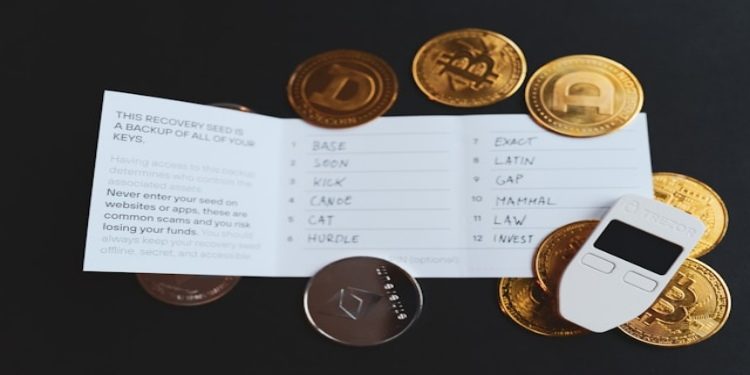Introduction
Paper wallets have been a staple in the cryptocurrency world, offering a secure method of storing digital assets offline. In the early days of Bitcoin, paper wallets were often touted as the ultimate solution for securely storing cryptocurrency, as they provided a way to keep private keys completely offline, away from potential online threats such as hackers and malware. However, with the advancement of technology and the emergence of new storage solutions like hardware wallets, the question arises: Are paper wallets still a safe way to store your cryptocurrency? If you wish to learn about investing with education companies, you might consider visiting Crypto Dezire.
What is a Paper Wallet?
A paper wallet is a physical document that contains a public address for receiving cryptocurrency and a private key for accessing and spending that cryptocurrency. The private key is typically printed in the form of a QR code, which can be scanned with a smartphone or other device to easily access the funds. Paper wallets are often generated using software that ensures the randomness of the keys, making them extremely difficult to crack.
Security Aspects of Paper Wallets
One of the key advantages of paper wallets is their security against online threats. Since the private keys are stored offline, they are not susceptible to hacking or malware attacks that often target online wallets and exchanges. Additionally, paper wallets can be encrypted and stored in a safe place, providing an extra layer of security.
However, paper wallets also come with their own set of risks. Physical damage, such as fire, water, or even simple wear and tear, can render a paper wallet unreadable, resulting in the loss of the cryptocurrency stored on it. Furthermore, if the paper wallet is lost or stolen, there is no way to recover the funds unless a backup of the private key is made.
Are Paper Wallets Still Relevant?
In today’s cryptocurrency landscape, paper wallets are still considered a viable option for storing cryptocurrency, especially for those who prioritize security and are willing to take the necessary precautions. While hardware wallets have gained popularity due to their ease of use and additional security features, paper wallets remain a popular choice among cryptocurrency enthusiasts who value the security of offline storage.
Best Practices for Using Paper Wallets
To ensure the security of your cryptocurrency when using a paper wallet, it is important to follow some best practices:
- Generate the Paper Wallet Securely: Use a reputable paper wallet generator to create your paper wallet. Ensure that the generator is offline and that your computer is free from malware.
- Store the Paper Wallet Safely: Store your paper wallet in a secure location, such as a safe or a safety deposit box. Keep it away from water, fire, and other potential hazards.
- Create a Backup: Make a backup of your paper wallet and store it in a separate secure location. This will allow you to recover your funds in case the original paper wallet is lost or damaged.
- Use Encryption: Consider encrypting your paper wallet for added security. This will make it more difficult for unauthorized individuals to access your private keys.
- Monitor the Paper Wallet: Regularly check the balance of your paper wallet to ensure that your funds are safe. Consider transferring small amounts of cryptocurrency to a hardware wallet for day-to-day use.
Alternatives to Paper Wallets
While paper wallets are a secure way to store cryptocurrency, several alternatives offer additional security features and convenience:
- Hardware Wallets: Hardware wallets are physical devices that store your cryptocurrency offline. They offer a higher level of security than paper wallets, as they are often encrypted and require a PIN to access.
- Software Wallets: Software wallets are applications that run on your computer or smartphone. While they are convenient, they are more susceptible to hacking and malware attacks compared to paper wallets and hardware wallets.
- Exchange Wallets: Exchange wallets are wallets provided by cryptocurrency exchanges. While convenient for trading, they are considered less secure than other storage options, as exchanges are often targeted by hackers.
Conclusion In conclusion, paper wallets are still a safe way to store your cryptocurrency, provided that you take the necessary precautions to secure them. While they may not offer the same level of convenience as other storage options, such as hardware wallets, they are a viable choice for those who prioritize security. By following best practices and staying informed about the latest security trends, you can ensure that your cryptocurrency remains safe and secure.
David Prior
David Prior is the editor of Today News, responsible for the overall editorial strategy. He is an NCTJ-qualified journalist with over 20 years’ experience, and is also editor of the award-winning hyperlocal news title Altrincham Today. His LinkedIn profile is here.


![7 Best POS Software in the UK [2026 Edition]](https://todaynews.co.uk/wp-content/uploads/2026/02/7-Best-POS-Software-in-the-UK-2026-Edition-360x180.png)








































































![7 Best POS Software in the UK [2026 Edition]](https://todaynews.co.uk/wp-content/uploads/2026/02/7-Best-POS-Software-in-the-UK-2026-Edition-120x86.png)

